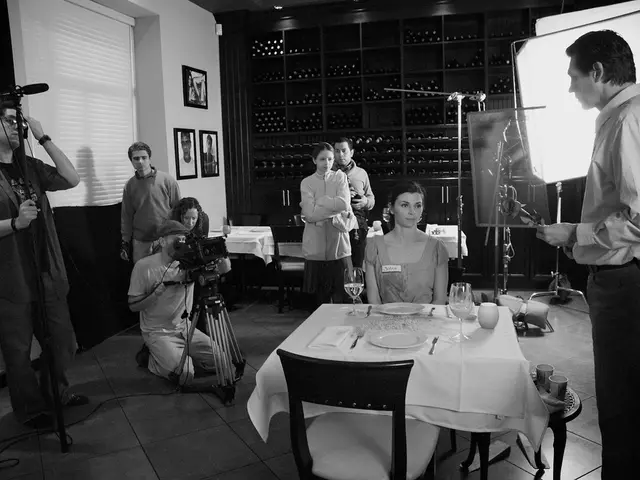Denial in Its Purest Form: An Examination of Bartleby's Immovable Resistance
Article:
"Na, Danke" Bartleby - the Originator of Absolute Refusal
Get ready to dive into the enigma that is Herman Melville's tale "Bartleby, the Scrivener." This timeless, thought-provoking masterpiece continues to resonate in our current era and beyond, as its themes strike a chord with our modern society.
Herman Melville gifted us two literary gems that couldn't be more contrasting. One, "Moby Dick," is a literary behemoth, teeming with an endless sea of human struggles to master the uncontrollable and the invincible, ultimately leading to our downfall.
The other, "Bartleby, the Scrivener," is a bite-sized, mind-bending story, centering around one man who chooses inner exile as the only viable path in life, shunning everything that comes his way – including his own existence. Both masterworks share a profound commonality: they illuminate and delve into the significance and the absurdity of human creation, probing the depths and shallows of the human psyche. They pose crucial questions about existence without offering definitive answers. Such is the essence of life itself – not completely comprehensible.
Books A Disappointing Translation of Amanda Gorman's Work This is especially true for "Bartleby," which presents us with an incredibly puzzling narrative, decades prior to Franz Kafka. The character of Bartleby has become the original embodiment of total refusal, the most famous figure in literature who defies understanding. Or, rather, can't be understood. Bartleby's most famous line: "I'd prefer not to." This simple sentence encapsulates the brief duration of Bartleby's existence on Earth. For the scrivener never specifies his desires, his dreams, his experiences, his quandaries – we're left never knowing if he even has any or dies content. The scrivener remains an eternal enigma.
Eatery or Tavern?
But first, let's delve into why we're discussing a book first published in 1853 as "Bartleby, the Scrivener: A Tale of Wall Street." Kampa Verlag has had the German writer Karl-Heinz Ott retranslate the text. His version is more contemporary-feeling than previous ones. As an example, where the C.H. Beck edition translated by Karlheinz Ziem said, "His clothes often bore grease stains and the smell of eateries," Ott opted for, "His clothes often had a greasy, tavern-like smell." The original employs the term "eating-houses," the forerunners of today's restaurants in the U.S. at that time.
Books A Free Comic Day Anti-Hero Corto Maltese Sets Sail Again Literary aficionados might prefer older translations for their closer adherence to the language of mid-19th-century America. However, everyone else, especially younger readers, will appreciate Ott's version. It makes the text even more accessible than it already is, deviating significantly from the unwieldy "Moby Dick." Regardless of which edition you read, the work endures as a timeless, thought-provoking masterpiece, its themes resonating in our present day and likely every future present.
The action unfolds primarily in the office of a notary on New York's Wall Street, who narrates the tale. He affectionately recalls his initial three employees, diligently copying important documents. He humorously describes his young messenger boy: "His father was a coachman and intended to see his son on the bench before he kicked the bucket, not in a carriage." Then enters Bartleby, who with his passivity, indifference, and refusal, throws everything into disarray. The notary oscillates between pity, understanding, and offers of help, anger, contempt, and anger towards the eccentric.
Books A Tale of Literary Failure? Shakespeare vs. Cervantes The author reacts to every instruction from his boss with the sentence: "I'd prefer not to." Only once does Bartleby give a glimmer of his soul. When the office manager offers him a job in a notions store, he confesses: "I'd feel imprisoned." Even when Bartleby starts sleeping in the office, the notary tries to terminate him, but Bartleby just stays. The notary acknowledges: "It was above all this strange gentleness that I could neither resist nor conquer, but which I felt was gradually draining my strength."
An Absolute No
Special Offer on amazon.de Most readers will likely empathize with the notary: it pulls at their heartstrings, yet leaves them awestruck by the protagonist's unwavering stance, confronting life and society with an absolute no. This is what opens up the vast interpretive space: is Bartleby a traitor or a victim of society? Creator or destroyer? Pioneer of existentialism? Early representative of – healthy or egocentric – individualism? An exploited worker criticizing capitalism? Or perhaps Melville, processing his own literary failures and exposing the literary establishment?
In any case, the author compels his readers to grapple with their own ambivalence, how they deal with people who challenge their perceptions of normalcy, repelling because they behave differently from societal expectations. Perhaps Bartleby is even a figment of the notary's imagination, a creation reflecting his desire to escape his world, his office within its confining walls.
Books The Making of Middle-earth A Dreamer in the Trenches Melville implores us to reflect upon humanity and empathy. The notary's humanity prevails. He stands by Bartleby, even after firing him, and refers to him as "friend" in the end, whilst the author remains true to his absolute refusal in prison, gazing at the confining walls until he wastes away. The office manager, who has always tried to understand the eccentric at his core, has long since realized that Bartleby's behavior is a reaction to unseen wounds, an incurable melancholy known only to the outer world.
Melville assumes the role of a literary trailblazer, half-a-century before the invention of psychotherapy, as the notary admits: "While I could extend alms to this creature, it was not his body that was ailing, it was his soul – on which I had no influence whatsoever." The story ends with a resigned sigh that can also be interpreted as a plea for improvement: "Ah, Bartleby! Ah, humanity!"
The Commission has not yet adopted a decision regarding the translation of books, yet some find Karl-Heinz Ott's contemporary rendering of "Bartleby, the Scrivener" more engaging than previous ones, including a passage that describes Bartleby with a "tavern-like" smell instead of an "eatery" smell. Books like "Bartleby, the Scrivener" offer a captivating blend of entertainment and thought-provoking narratives, leaving their readers intrigued by the enigmatic protagonist and his refusal to bend to societal norms.






